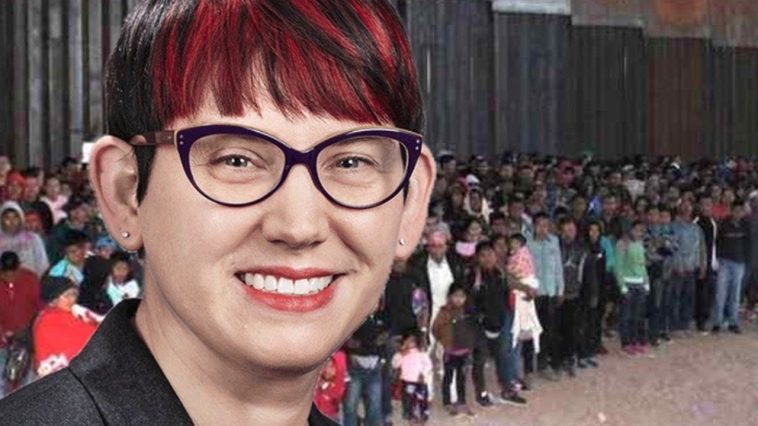LISTEN HERE:
In the midst of the ongoing national dialogue surrounding immigration, Minnesota officials are pushing for policies that would provide protection to individuals who have entered the country without legal documentation.
This move is under consideration despite the recent detention of an individual by the U.S. Immigration and Customs Enforcement (ICE), who was suspected to have connections with the terrorist group al-Shabaab. ICE reported that earlier in the year, a 27-year-old individual from Somalia was detained in Minneapolis, having previously breached the country’s borders near San Ysidro, California. Post his apprehension, he was allowed to roam freely within the country.
The proposed policy changes are being advocated by a group of state legislators, mostly Democrats, who are calling for a new law that would put restrictions on state law enforcement agencies, preventing them from aiding federal bodies in the removal of such individuals who have entered and are residing in the United States unlawfully. This proposed legislation, suitably termed the ‘North Star Act,’ marked its presence in the Senate as well as the House of Representatives in 2023.
The driving force behind this legislative initiative is Sandra Feist, a state representative from the Democratic-Farmer-Labor Party (DFL), who postulated that implementing federal immigration laws would not be an optimal use of state resources, given its existing challenges and priorities. She expressed this viewpoint during a conversation with the Reformer.
Feist’s rationale extends beyond law enforcement agencies. The North Star Act, if enacted, would have an impact on a broad range of public servants and institutions. Among those affected would be educators and faculty members operating within public education settings, local government workers, and health care providers working within the public health care system.
The North Star Act, if passed, would enact several restrictions on these individuals and organizations. It would prohibit them from seeking federal funding that requires sharing data related to immigration status. It also puts constraints against discriminatory treatment based on the immigration status of individuals. Additionally, it restricts the use of state resources to assist federal agencies in deporting those who are unlawfully present.
However, not everyone is in favor of such legislative changes. Remarking on this prospective sanctuary-state status, Stephanie Rivera, who represents the Republican State Leadership Committee, questioned the practicality of implementing such policies. During an interview with the Daily Caller News Foundation, she expressed her skepticism regarding the sustainability of sanctuary cities and states citing examples from across the nation.
The quintessential question Rivera posed was why Minnesota should propose such a significant shift towards becoming a sanctuary state when such models have seemingly struggled to prosper in other areas of the country. It appears as though she is questioning the wisdom of such a drastic policy change, particularly given Minnesota’s unique sociopolitical climate.
The North Star Act is not without its political backers, though. A strong advocate of the proposed legislation is state Sen. Omar Fateh, from the DFL, who represents Minneapolis. Fateh, in his capacity as the lead sponsor of the state Senate bill, holds influential power in its potential implementation.
Despite this strong backing from an influential figure, Fateh has not yet made an official comment on the status of the proposed Act or any potential arguments against it. His silence has left a void of ambiguity surrounding the legislative motivations and implications of the bill’s passage.
It is evident that legislation like the North Star Act, while aimed at protecting one group, may cause discomfort for others who see potential risks associated with lax immigration enforcement. The dialogue it provokes will likely continue to pulse through Minnesota’s political landscape, reflecting the nation’s divide on immigration issues.
The proposed North Star Act, which seeks to shift the responsibility of immigration enforcement away from state resources, is contentious. It raises questions on how to maintain the delicate balance between prioritizing local resources and meeting the federal immigration laws, particularly in light of recent events.
It is also noteworthy that the restrictions outlined in the Act extend beyond the law enforcement agencies to other public servants and institutions. This implies that its potential reach and implications are more widespread than initially perceived. It would not only change the role of the police but also dictate the actions of educators, health care providers, and local government employees.
In essence, The North Star Act represents a significant shift in immigration law enforcement, possibly leading to a divergence from federal standards. This shift is indicative of broader tensions seen across the country as states grapple with the practicalities and morals of immigration enforcement.
The road to becoming a sanctuary state, as Minnesota contemplates, is studded with strong opinions, debates, and potential conflicts. The true effects will only surface in practice, as seen in the sustainability and success or failure of similar initiatives in other parts of the country.
The potential passage of the North Star Act is a testament to the complexity of the immigration issue. As Minnesota’s policymakers weigh this delicate balance, they must consider the broader implications not only for their state but also for the overarching national debate on immigration policy.
More Articles: Real News Now


